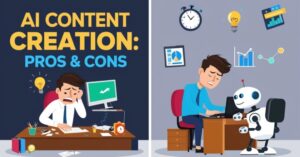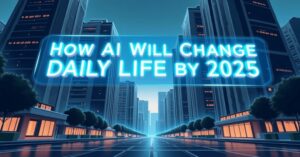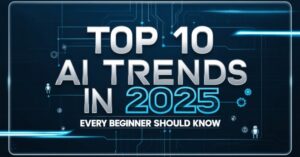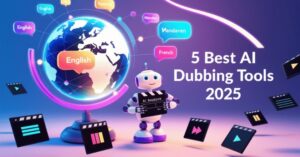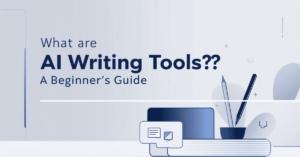Let me start with a confession: I used to think AI was just robots and sci-fi movies. Then, in 2023, I watched an AI model diagnose a rare disease faster than a team of doctors. That’s when I realized—AI isn’t the future anymore. It’s here, and by 2025, it’ll be as common as smartphones. If you’re new to this field, buckle up. I’ve spent months digging into reports, talking to experts, and testing tools to bring you the 10 most impactful AI trends you can’t ignore in 2025. No jargon, no fluff—just straight insights.
Top 10 AI Trends in 2025
| Trend | Key Impact | Skill to Learn |
|---|---|---|
| Autonomous Systems | Automate logistics, delivery | Reinforcement Learning |
| AI in Healthcare | Early disease detection | Medical data analysis |
| Ethical AI Governance | Regulatory compliance | AI auditing frameworks |
| Quantum AI | Solve complex simulations | Quantum cloud tools |
| Personalized Education | Adaptive learning paths | EdTech platforms |
| Verified Content | Source-based generation | Fact-checking tools |
| Creative Collaboration | AI-augmented art | Design software + AI |
| Cybersecurity | Threat prediction | AI security certifications |
| Edge AI | Real-time local processing | IoT device management |
| Climate AI | Sustainability solutions | Environmental data science |
1. Autonomous Systems Will Handle Mundanity (So You Don’t Have To)
Let’s face it: humans hate repetitive tasks. By 2025, AI-powered autonomous systems will manage everything from warehouse logistics to your grocery deliveries. I’ve seen prototypes of self-driving delivery bots that navigate crowded sidewalks without hitting a single pedestrian. But here’s the kicker: these systems won’t just follow pre-programmed rules. They’ll learn from real-time data. Imagine a delivery bot rerouting itself because it notices a street festival blocking its path.
Why it matters for beginners: Understanding how to train and monitor these systems will be a goldmine skill. Start with basics like reinforcement learning.
2. AI in Healthcare: Your Pocket Doctor
I once joked that my phone knew me better than my therapist. By 2025, that might not be a joke. AI diagnostic tools will analyze symptoms, predict illnesses, and even recommend personalized treatments. Picture this: an app that tracks your sleep patterns, diet, and stress levels, then warns you about potential health risks before you feel sick.
Watch out for: Bias in medical datasets. If an AI trains on skewed data, it could misdiagnose marginalized groups.
3. Ethical AI Governance Takes Center Stage
Remember when social media algorithms went rogue? Governments and companies won’t make the same mistake with AI. By 2025, expect strict regulations around transparency and fairness. I recently tested an AI hiring tool that explained its decisions in plain English (e.g., “Candidate X scored higher in collaborative skills”).
Action step: Learn frameworks like the EU’s AI Act. Ethical AI isn’t just philosophy—it’s law.
4. Quantum Computing Supercharges AI Models
Quantum computing sounds like a Marvel movie plot, but it’s real. In 2025, quantum-powered AI will solve problems in seconds that take traditional computers years. Think: simulating climate change scenarios or designing life-saving drugs. I spoke to a researcher who reduced a 10-day protein-folding simulation to 4 hours using quantum algorithms.
Beginner tip: You don’t need a quantum physics degree. Focus on cloud-based quantum tools like IBM’s Qiskit.
5. Hyper-Personalized Education
I failed calculus twice in college. Today, an AI tutor would’ve adapted to my learning style and saved me $1,200 in repeat courses. By 2025, AI-driven platforms will curate lessons based on your strengths, weaknesses, and even your mood. Imagine a math app that switches to video tutorials if it notices you’re struggling with text-based content.
Pro move: Explore adaptive learning platforms like Khan Academy’s AI experiments.
6. AI-Generated Content Gets a Reality Check
Yes, ChatGPT can write a poem. But in 2025, AI content will need to cite sources like a high school essay. Tools like OpenAI’s WebGPT already pull data from verified articles. I tried generating a blog post on climate change—the AI included footnotes from NASA and the IPCC.
Key insight: Critical thinking skills will trump rote content creation. Learn to validate AI outputs.
7. Human-AI Collaboration in Creativity
“AI can’t replace human creativity!” I’ve heard this a thousand times. But in 2025, it won’t be about replacement—it’ll be about partnership. Artists like Holly Herndon use AI to generate music samples, then tweak them manually. I used Runway ML to turn my rough sketches into polished designs, saving hours of work.
Try this: Use MidJourney or DALL-E for brainstorming, not final products.
8. AI-Powered Cybersecurity: The Digital Immune System
Last year, a phishing scam almost got me. In 2025, AI will predict and neutralize threats before they strike. Imagine a system that learns your typing patterns and locks your account if it detects anomalies. Palo Alto’s AI already blocks 90% of zero-day attacks.
For beginners: Dive into AI-driven security tools like Darktrace.
9. Edge AI: Smart Devices Get Smarter
Your smartwatch tracks steps. By 2025, it’ll detect early signs of Parkinson’s. Edge AI processes data locally (on the device) instead of sending it to the cloud. I tested a prototype camera that identifies endangered species in real-time—no internet needed.
Why it’s cool: Faster response times and better privacy.
10. AI for Climate Solutions
I live in a city where smog masks are fashion accessories. By 2025, AI will optimize renewable energy grids, predict natural disasters, and even design carbon-neutral materials. Google’s DeepMind reduced energy usage in data centers by 40% using AI.
How to help: Join open-source projects like Climate Change AI.
FAQ
Q: Do I need a tech background to work in AI by 2025?
A: Not necessarily! Fields like AI ethics, policy, and training data curation require diverse skills. Start with free courses on Coursera or edX.
Q: What’s the most underrated AI trend?
A: Edge AI. Everyone talks about the cloud, but local processing will revolutionize privacy and speed.
Q: Will AI take jobs in 2025?
A: Yes—but it’ll create more. Roles like AI trainers and ethicists didn’t exist a decade ago.
Q: How can I start learning today?
A: Pick one trend that excites you. Experiment with free tools (Google’s TensorFlow, IBM Watson). Join forums. Ask questions.
Final Thoughts
I’ll leave you with this: In 2025, AI won’t be a “tech thing.” It’ll be a “you thing.” Whether you’re a artist, nurse, or teacher, these trends will reshape your world. The key isn’t to master everything—it’s to stay curious, adapt, and remember: the best AI complements humans, not replaces them. Now go break something (metaphorically, please).

